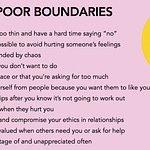Before you read or listen: Have you donated to GLITS yet? They are trying to secure the funds to purchase property in NYC to serve as a sanctuary for trans women. Please click here and send them some money!!
Listen to the audio above, or read below!
I want to talk about respectability. What does it mean that a person is deserving of respect? What is at risk when we can’t fit the mold? What does respect mean when we think about the state as the most egregious upholder of white supremacy? What happens when the disrespectable join forces to fight together?
Every ounce of my political beliefs, inclusive of sexual freedom, comes back around to this very idea of respectability. Shunning or legislating the socially unacceptable is the American way; it’s in our laws, the punchline of our jokes, our prayers, our media, our schools, etc. Many of us are taught from a young age by our parents how to fit in and be a nice kid—what to wear, how to speak. This guidance is usually racialized and gendered. If our parents didn’t fill our heads with ideas about how to occupy a place of respectability, society picked up the slack.
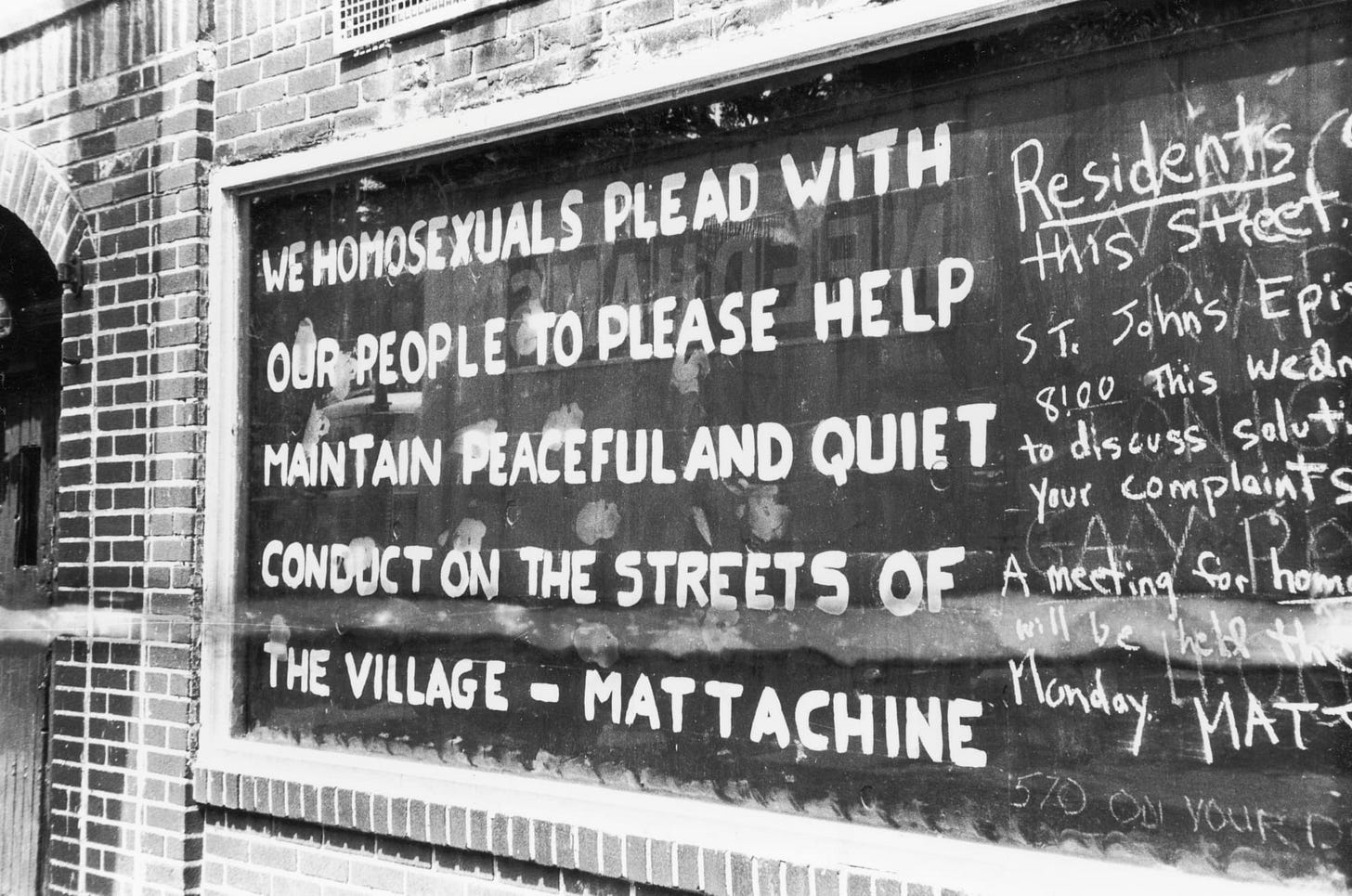
The Mattachine Society, urging for a respectable riot. Stonewall 1969.
The idea of a “politics of respectability” has deeply racist roots. Although Black scholars and theorists were writing about the subject for a long time, the term itself was first introduced by Evelyn Brooks Higginbotham in her 1993 book Righteous Discontent: The Women's Movement in the Black Baptist Church: 1880–1920. The concept of respectability politics is in reaction to racist stereotypes, meaning that in order to be seen as human and gain the respect of white people, Black people had to abandon cultural practices and appeal to white morality. This is tied up with upward mobility and capitalism in that in order to hold jobs or get advanced degrees, many would argue that whether you bought into it or not, it was necessary for survival to play by the white man’s rules.
We owe the articulation of this concept to Black academics, but if we look around just for one minute in any direction, we notice that literally everything is soaked in respectability politics. From voting disenfranchisement for felons, to drug users, to the criminalization of sex work, to fat people simply existing—if you don’t comply with perfect white Christian morals you’re subject to being deemed a stain to society or legally stripped of your rights (if you had any in the first place).
My first major “Ah-ha!” moment as a young person just learning about my own politics was when I attended a presentation in 2010 by Ryan Conrad to promote the Against Equality book Queer Critiques of Gay Marriage at the NYC bookstore Bluestockings. My hatred for marriage started when I was young and was completely irrational to me for a long time. I didn’t understand why gays wanted to get married so badly, I thought a great thing about being gay is that we didn’t have marriage. I attended this event on a whim not knowing that Against Equality was founded by radical queers with abolitionist politics. A lightbulb went on for me that caused a domino effect when I listened to the presentation that night. The politics of the mainstream gay movement to legalize same-sex marriage was an assimilationist top-down approach to both participate in the institution of marriage and clamor for the respect of the state. It hit me that so much of this struggle was ultimately about respectability. (I’m gonna stop here because I could rant forever.)
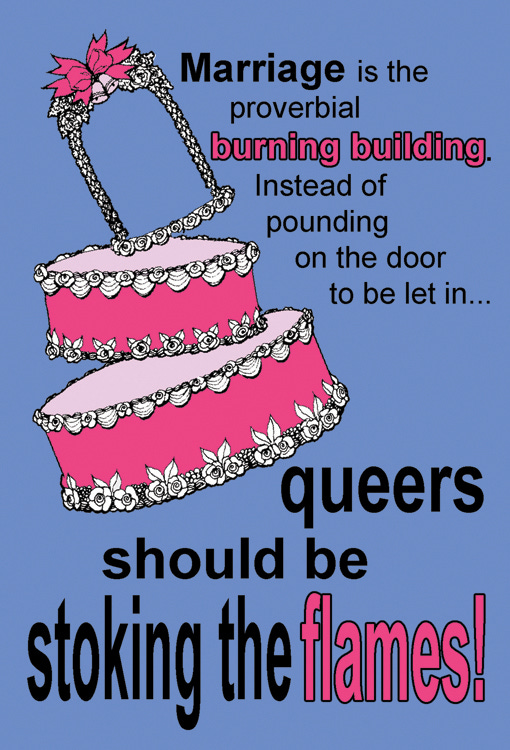
Postcard by Ryan Conrad for Against Equality
The Marriage Equality movement, and Equality in general, spat directly in the face of trans activists who had long been fighting for the right to simply stay alive, it drowned out their struggles with wedding registries and rainbow capitalism. The reason—respectability. These gays *white, cis, wealthy* are more palatable and acceptable to homophobes than these gays *PoC, trans, poor*. The idea of what is referred to as “trickle-up” queer politics threatens the white, wealthy, cis, gay voice by praxis, it centers the survival of those most vulnerable in our community, Black trans women. The equality activism of these neo-liberals fails to understand that we can’t actually move forward if we leave anyone behind.
All this to say that hating marriage was my entry point into abolition politics. I quickly learned that abolition politics were basically anti-respectability politics. These queer activists lead the way to other struggles for queer and trans liberation. I remember closely following Cece McDonald’s fight for freedom in 2012, a Black trans woman in Minneapolis who stabbed her attacker in self-defense. Her case was championed by Tourmaline and Dean Spade of the Sylvia Rivera Law Project. I was inspired by Jay Toole’s passion to advocate and care for street-based queers in New York City by founding Queers for Economic Justice. When introducing herself at events she proudly named that she was a real stone butch, a disclosure I’m sure some would find disrespectable. I read furiously and learned all the ways the state has historically kept us down by criminalizing Blackness, queerness, and gender deviance.
Now that we are again in June, the “No kink at Pride” queers are coming out of their fun-hating caves to denounce sexuality at Pride while somehow still maintaining a queer sexual identity. They say they want to protect children and place puppies on leashes on the pearl-clutching pedestal of visions that scar children for life. The way that I have approached self-soothing over this yearly debate is to remind myself that like most other bad takes, it is completely ahistorical for more reasons than I have time to dive into. This moral panic is the grandchild of the one that said all gay people are child molesters. The new blatant shift to individualism evidenced by young people requiring 700 different pride flags for each varying degree of sexuality (thus validating their special snowflakeness) tells us that being queer has morphed from a practice or action, and is now merely a defanged identity. Today, with a rightful middle finger to gatekeeping, all you need to do to be a queer is to identify that way, and especially on the internet. Building bonds in queer community and learning from elders and fucking and loving AND FUCKING FUCKING FUCKING are no longer rites of passage. However, our rich history reminds us that both the joy and weight of embodying queerness has always meant so much more.

No kink at Pride contingent of young queers, names blurred because I don’t want anyone harassing them :)
I would argue that gay community emerged to spite criminalization. Sodomy and buggery laws date back to the 1500s born from morality and respectability. In 1600s Florence there was a special patrol called the Office of the Night to catch gay men in the act of cruising. In London they had the Society for the Reformation of Manners (sounds like my new kinky school for brats tbh), which focused on policing street-based acts of buggery and sex work. Queer community has always had an open atmosphere of sexuality precisely because it was forbidden. We separate the sex from sexuality because we forget that queers have been criminalized for hundreds of years LITERALLY for the immoral sex we have.
Once law enforcers realized it was harder to catch evil gay sex in the act, they created new ways to target and criminalize us with decency laws. The Lavender Scare of the 1950s allowed the government to fire any employee even suspected of being a homosexual, which sent a ripple of anti-gay moral panic throughout the country. To criminalize gender variance, bullshit masquerade laws were used to arrest anyone suspected of cross-dressing. The “three article” rule enforced that you had to wear three pieces of clothing traditionally worn by your gender. Historians confirm that this cannot be found in any laws of the time, and was made up by police for an excuse to harass gender deviants. Police considered being gay in public a crime for “disturbing the peace” and bars owners refused service to anyone who looked gay or appeared gender deviant because in doing so they could get shut down. When New York City “cleaned up” the strolls worked by trans women of color, the “Walking While Trans” statute picked up the job of criminalization.
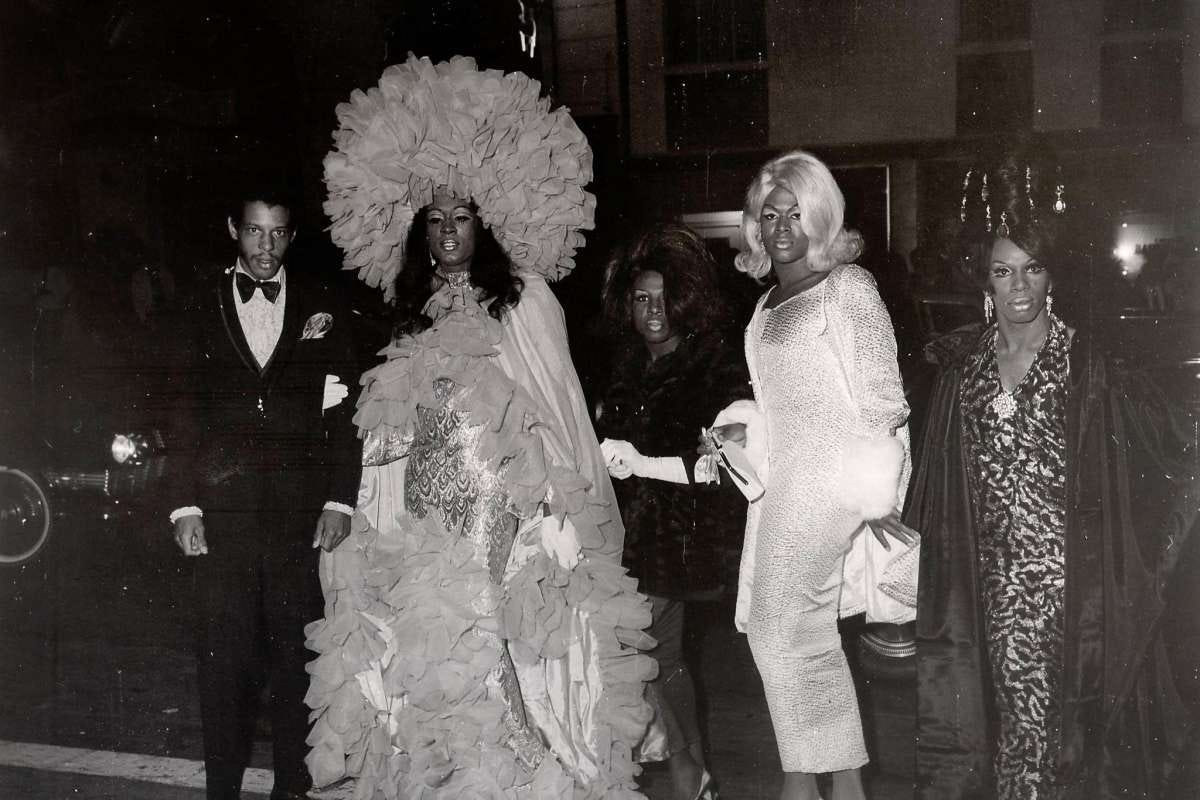
Image from SF Chronicle 1965 people attending a drag ball and breaking gender clothing rules
In Coming to Power (1981), there is a detailed account by Pat Califia about the ban on leather and SM regalia at the 1979 San Francisco Gay Freedom Day Parade. Can you imagine being gay and being hassled and targeted by police for what you wear, and then a few years later you try to police what other gay people are wearing at a parade celebrating gayness??? Samois and allies campaigned for the right to wear whatever they wanted to the parade, and thus the famous “Leather Menace” t-shirts with the whip across the chest were born. The sentiment was part of the anti-porn crusade of second wave feminists. This created a feminism of respectability by shunning those who didn’t fit into a made up idea of what the women’s movement needed to look like. Beyond hating porn, they believed SM was abuse and promoted violence against women, and that femme and butch dykes were roles that upheld the patriarchy. The idea still stands—if you check these boxes and fit into this mold, you will be a good and acceptable lesbian.
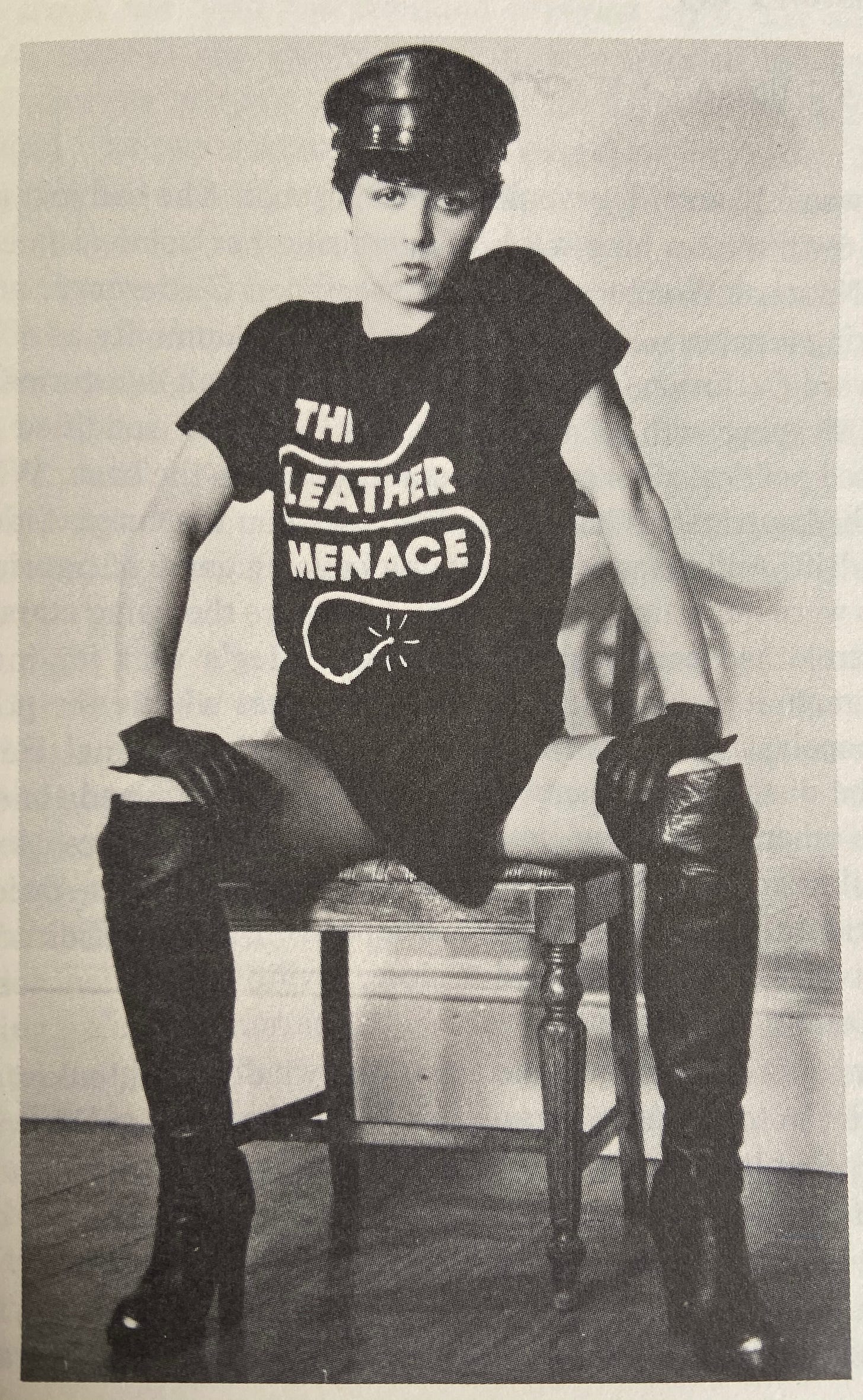
Image from Coming to Power depicting The Leather Menace t-shirt created by Samois
The thing about respectability politics is that it’s a slippery slope in that if you practice it in any form, you often end up on the side of conservative moral values. You also end up being a cop. It means that you believe what society has told you about what’s good and bad, who is worthy of love and redemption. It means that you don’t have compassion or empathy for other humans and you have decided that your idea of what’s moral or acceptable should be pushed onto people with different experiences. It means that you choose not to see the humanity in someone who doesn't meet your moral standards.
Respectability politics and on a larger scale, moral panics, uphold policing and white supremacy in any way you cut it!!! The history of queers, and the history of sex workers, and the history of Black liberation are inextricably linked from Compton’s Cafeteria to Stonewall. You can’t stand up for one and deplore the others. June 2020 is Black Pride month and we’re all living through a massive reckoning like we’ve never seen before! I hope everyone is doing their best to show up for Black lives and each other right now and always. Anti-racist work is ongoing and one way you can challenge yourself is to think about allll the ideas you might hold about respectability. Sit with what makes you uncomfortable. If you think anyone is exempt from respect or redemption, or that anyone deserves to be policed, I’m asking you to kill the cop in your head.
If you need help getting started, here are a wide range of things that society may consider disrespectable, and the consequences are vast:
-Slutty/revealing outfits
-Having visible tattoos
-Speaking AAVE/BEV
-Being undocumented
-Blackness
-Being houseless or unsheltered
-Being transgender or gender variant
-Dreadlocks, cornrows, other traditional African hairstyles
-Sex work
-Fatness
-STI Status/HIV Status
-Non-traditional sex
-Queerness
-Public displays of sexuality
-Working in fast food/other low-wage jobs
-Cursing/Swearing
-Watching pornography
-Being a drug user or having an addiction
-Mental illness
-Disability
-Having a history of incarceration/being currently incarcerated
-Nudity
-Not having an education
-Being poor
-Being a person of color
-Being unemployed
-Receiving welfare or social services
See you in the streets!
xx




